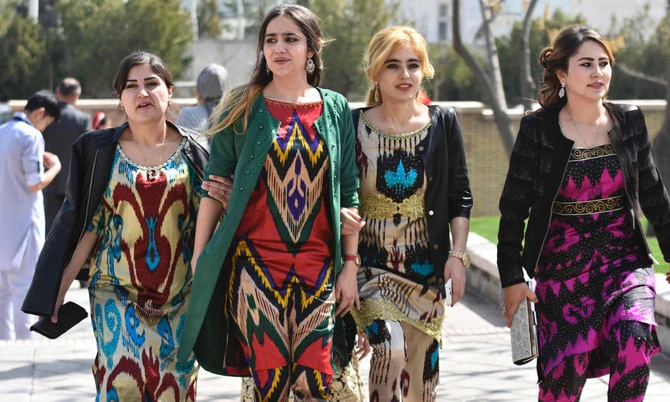Tajikistan bans Islamic attire, including headscarves and turbans
 A picture taken on March 19, 2017 shows Tajik women wearing the Atlas and other traditional dresses celebrating the spring Nowruz festival in Dushanbe. (AFP Photo)
A picture taken on March 19, 2017 shows Tajik women wearing the Atlas and other traditional dresses celebrating the spring Nowruz festival in Dushanbe. (AFP Photo)
The President of Tajikistan has approved a bill that bans the use of headscarves, turbans, and all Islamic symbols deemed foreign to the country’s culture.
President Imomali Rahmon signed off on a package of 35 bills on Thursday, including laws that prohibit wearing headscarves under the “Regulation of Traditions and Ceremonies” and “Responsibility for Child Education and Upbringing.”
As part of this measure, wearing attire deemed contrary to national culture, including the traditional “iydgardak” practice where children go door-to-door during religious holidays like Eid al-Adha, has been prohibited.
With President Rahmon’s approval, the use of headscarves, turbans, and all attire featuring Islamic symbols has been banned because they are “foreign to Tajik culture.”
According to a statement from the presidency, the legislative changes aim to preserve national cultural values, prevent superstition and extremism, and discourage extravagance during ceremonies and festivals.
Violators of these laws will face fines of up to 7,920 Tajikistani somoni (approximately ₺25,000) for civilians, 54,000 somoni (about ₺167,000) for government officials, and 57,600 somoni (around 178,000 lira) for religious authorities.
Official figures indicate that 99% of Tajikistan’s population is Muslim.
Headscarves have been effectively banned in government institutions and schools in Tajikistan for many years.
The official statement does not clarify whether the new bill restricting the public use of headscarves applies only to specific age groups of children.
Furthermore, men are also prohibited from growing beards in the country, with reports in recent years of thousands being stopped by police and forcibly shaved.



